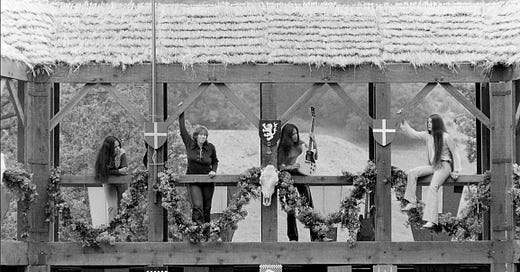Rock and Roll Women: Fanny (1970-1975)
Better than many in the Rock and Roll Hall of Fame? I think so.
Fanny were founded by two sisters, June and Jean Millington, who had immigrated from the Philippines to the U.S. as children. They recruited a drummer and a keyboardist and started jamming. They were not quite the first all-girl band to sign with a major label, but can be considered the earliest to break into the big time: They were the first to release a full major-label album, and the first to have two charting singles. And read on for some of huge names with whom they toured or shared billing.
They went through a few lineup changes over their five years as an active band, but generally the splits were amicable-- most of the musicians worked on each others’ projects after the band broke up. One of their members for the latter part of their history was Patti Quatro, sister of Suzi and former member of the Pleasure Seekers. Patty would go on to produce some of their solo work after they broke up as a band.
They toured or double-billed with many of the major (male) rock bands of the day including Jeff Beck, Chicago, Creedence Clearwater Revival, the Kinks, Procol Harum, Jethro Tull and Slade. They collaborated with musicians and engineers who had worked with the Beatles and the Stones, and their last album was produced by Todd Rundgren. Unfortunately, things started to unravel when philosophical differences and pressure to tart themselves up led to June quitting the band (she was unwilling to see them “become a T&A band”). They continued on for one more album, but then disbanded in 1975.
Fanny had to navigate not only sexism, but racism (the two founders were half-Asian, and it would still be years before Asians, male or female, were accepted as rock musicians) and homophobia (June Millington and drummer Alice de Buhr were gay). They still managed to win over both their audiences and many of the musicians they met on tour, a lot of whom informally mentored them. While official rock histories have often erased them, Fanny are cited as key influences by many bands that came after, including the Runaways, the Bangles, the Go-Gos, Siouxie and the Banshees, and the B-52s.
When you watch these clips, two things become clear: First, they refused to be packaged as sex objects; and second, they can REALLY play. In addition to the other bands who toured with them, David Bowie and Lowell George praised their musicianship in the highest terms. In other words, top mainstream (read “male”) musicians took them very seriously. But don’t take their word for it. Listen and see for yourself!
…..
“Special Care” (Fanny)
Showcase for Jean Millington’s dirty, bluesy vocals, some great back and forth jamming among guitars, bass and keyboards, and a great ending with overdriven guitar that foreshadows some of the late 70s proto-metal bands.
…..
“Place in the Country” (Nickey Barclay, Fanny)
The opening riff reminds me of Cream’s version of “Born Under a Bad Sign”, but then they go off in a different direction altogether. Lots of great vocal counterpoints and some slick guitar leads by June Millington. The bridge would have been at home in an Allman Brothers jam.
“You’re the One” (Fanny) (live, BBC)
Compelling groove, wonderful fills and runs by the keys and drums, tight vocal harmonies, and June’s out-of-this-world fuzz guitar. This performance makes a good case that with a record label that took them seriously, they would have been huge stars.




I think so too. But I don’t consider the RRHoF any measuring stick for talent or greatness.
I’m not a religious person but you are doing the lord’s work here. I feel like I’m getting to audit the “Unsung Women in Music” university course.
Learning about Fanny is awesome alone, but discovering the Beat-Club channel on YouTube is huge.